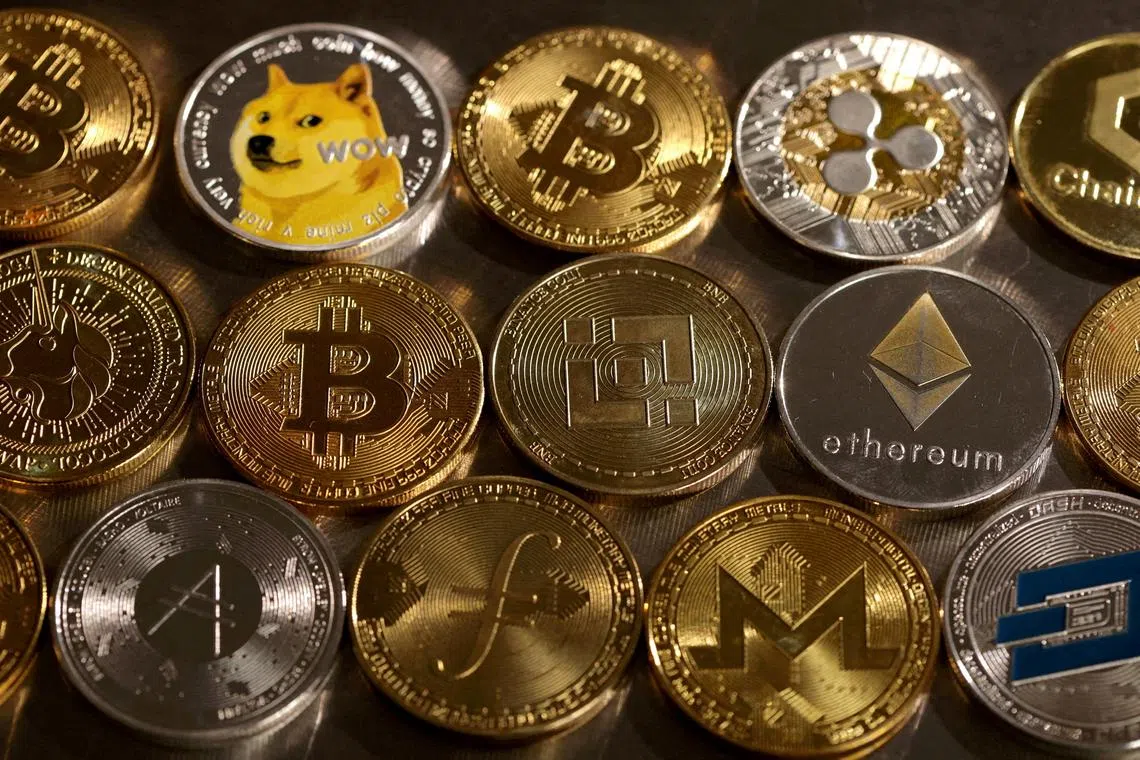Asian financial institutions keen on tokenisation to cut out middlemen, lower costs
Sign up now: Get ST's newsletters delivered to your inbox

Advantages of blockchain-based tokenisation include faster settlement of transactions and more transparency, among other benefits, said respondents.
PHOTO: REUTERS
SINGAPORE – Financial entities in Asia are warming to the tokenisation of real world assets as they find ways to cut out middleman fees in transactions.
A survey by SBI Digital Assets Holdings of more than 50 financial institutions in Asia, such as banks and asset managers, found that almost half of those polled said cutting out intermediaries was the top benefit of tokenisation of real world assets such as property and funds.
Firms usually charge fees for their services and fewer intermediaries will mean financial institutions cut costs. The focus on cutting costs comes as interest rates remain high and returns are low.
Other advantages of blockchain-based tokenisation cited by respondents were faster settlement of transactions, more transparency, cost efficiency, increased liquidity and fractional ownership, the survey said.
Still, the transition to tokenisation looks to remain gradual. Respondents said they expected less than 20 per cent of the market they are in to be in digital assets by 2026.
Less than 25 per cent of those polled believed that 20 per cent to 40 per cent of their market will involve transactions in digital assets by 2026.
The survey said the lack of institutional-grade market infrastructure and the lack of wider market adoption and regulatory clarity were key barriers to investing in digital assets.
Institutional-grade market infrastructure is required for compliance purposes, scalability and security.
Safety of the tokenised securities was a key concern, with 62 per cent of respondents saying they prefer a trusted ecosystem that has end-to-end digital asset transactions.
The survey also showed that real estate was the most preferred real world asset to be tokenised (39 per cent). This was followed by funds (15 per cent), physical infrastructure (14 per cent), bonds (10 per cent), collectibles (10 per cent), equities (6 per cent) and precious metals (2 per cent), among others.
The survey said despite the current “crypto winter”, 60 per cent of respondents said they had greater exposure to digital assets in the past 12 months. There has been a slowdown in the crypto market following the collapse of many globally prominent players in 2022, including exchange FTX hedge fund Three Arrows Capital.
About 60 per cent also noted a rise in client demand for tokenised securities.
Of the organisations that are actively transacting or investing in digital assets, 38 per cent said they planned to maintain status quo in the next 12 months, while 26 per cent intended to increase volumes significantly over the next year.
Of those actively trading in digital assets, 70 per cent said cryptocurrencies were their top choice. This was followed by security tokens, central bank digital currencies (CBDCs) and non-fungible tokens (NFTs).
In terms of priority, respondents said cryptocurrencies were the main focus of their investments, followed by security token offerings, stablecoins, CBDCs and NFTs.
Mr Fernando Luis Vazquez Cao, chief executive of SBI Digital Assets Holdings, said the findings reflect the evolving perspectives and priorities of financial institutions when it comes to the tokenisation of tangible assets such as real estate.
“As the digital asset ecosystem continues to mature, institutional-grade infrastructure coupled with regulatory certainty will be pivotal to shaping the future of financial markets,” he said.
Lower cost of issuance and post-trade costs, access to new or global capital, and a shorter transaction settlement period were named key factors in organisations’ decisions to invest in tokenised securities.
When asked, SBI Digital Assets Holdings said the cost of issuing tokens varies according to the product and procedures. It said that there are no actual case studies of cost savings for now.
It added that its subsidiary, SBI Digital Markets, is working on an upcoming deal that will showcase the actual cost savings passed on to investors who bought tokenised securities, compared with a similar traditional security setting.
SBI Digital Assets Holdings is the digital asset arm of Japanese financial services group SBI Holdings.
Subsidiaries under the digital assets arm are: Singapore-based digital solutions provider SBI Digital Markets; digital asset exchange AsiaNext, which is a joint venture with Swiss market operator SIX; Tokyo-based SBI Security Solutions; and cryptocurrency storage provider SBI Zodia Custody, which is a joint venture between SBI and Standard Chartered.
The company also has investments in other firms in the digital asset space including Swiss crypto bank Sygnum, and a German stock exchange’s crypto arm, Boerse Stuttgart Digital Exchange, among others.
The survey, which is the first of its kind from SBI, was conducted in October on financial institutions from various regions with operations in Asia.



